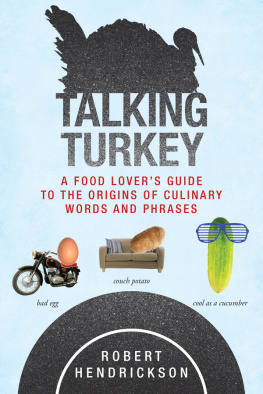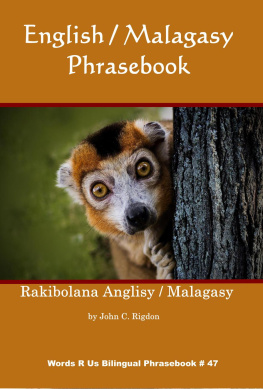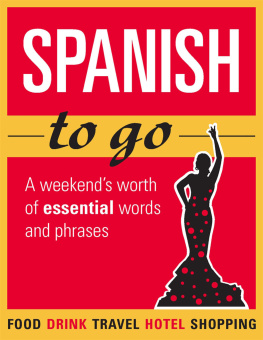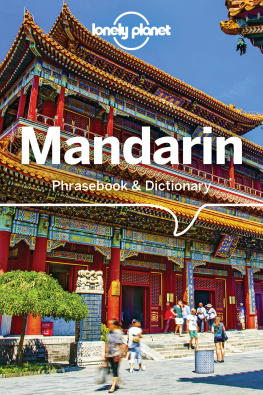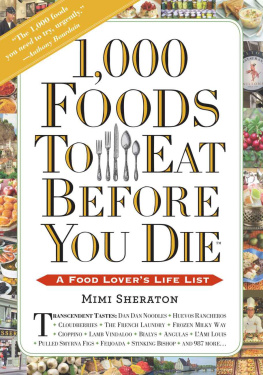

Copyright 2014 Robert Hendrickson
All Rights Reserved. No part of this book may be reproduced in any manner without the express written consent of the publisher, except in the case of brief excerpts in critical reviews or articles. All inquiries should be addressed to Skyhorse Publishing, 307 West 36th Street, 11th Floor, New York, NY 10018.
Skyhorse Publishing books may be purchased in bulk at special discounts for sales promotion, corporate gifts, fund-raising, or educational purposes. Special editions can also be created to specifications. For details, contact the Special Sales Department, Skyhorse Publishing, 307 West 36th Street, 11th Floor, New York, NY 10018 or info@skyhorsepublishing.com.
Skyhorse and Skyhorse Publishing are registered trademarks of Skyhorse Publishing, Inc., a Delaware corporation.
Visit out website at www.skyhorsepublishing.com.
10 9 8 7 6 5 4 3 2 1
eISBN: 978-1-62873-910-7
Library of Congress Cataloging-in-Publication Data is available on file
ISBN: 978-1-62636-550-6
Printed in China
Contents
E DITORS N OTE

Food is a favorite topic of conversation around the worldhow to create it, how to season it, how to compliment it with other foods, how to serve it... the list goes on. Yet little attention is paid to where the names of food come from or why so many of our daily phrases involve food, whether or not they actually relate to the kitchen. Fortunately, this delightful phrasebook is here to bring some foodie history to the table!
Bring home the bacon, couch potato, in a pickle... all phrases we use regularly, at home, with our friends, about ourselves, but where do they come from? Talking Turkey is here with the etymology of each phrase, meticulously going through historical facts before presenting it in a few concise words. Go on, flip throughyoure guaranteed to find some surprises!
A

acknowledge the corn . Much used in the 19th century as a synonym for our copping a plea, this phrase is said to have arisen when a man was arrested and charged with stealing four horses and the corn (grain) to feed them. I acknowledge [admit to] the corn, he declared.
acorn . Acorn is an ancient word deriving from the Old English aecern, meaning fruit or berry. Its present form acorn is due in large part to folk etymology; people believed that the word aecern was made up of oak and corn because the fruit came from the oak and was a corn or seed of that tree. Thus aecern came to be pronounced and spelled acorn.
Adams apple . Adam never ate an apple, at least not in the biblical account of his transgressions, which refers only to unspecified forbidden fruit on the tree in the Garden of Eden. The forbidden fruit of which the Lord said Ye shall not eat of the fruit which is in the midst of the garden, neither shall ye touch it, lest ye die (Gen. 3:3) was probably an apricot or pomegranate, and the Muslimsintending no jokebelieve it was a banana. Many fruits and vegetables have been called apples. Even in medieval times, pomegranates were apples of Carthage; dates, finger apples; and potatoes, apples of the earth. At any rate, tradition has it that Adam succumbed to Eves wiles and ate of an apple from which she took the first bite, that a piece stuck in his throat forming the lump we call the Adams apple , and that all of us, particularly males, inherited this mark of his fall. Modern scientific physiology, as opposed to folk anatomy, explains this projection of the neck, most prominent in adolescents, as being anterior thyroid cartilage of the larynx. But pioneer anatomists honored the superstition in the mid-18th century by calling it pomum Adami , or Adams apple . They simply could find no other explanation for this evasive lump in the throat that even seemed to move up and down.
agave . Any of several southwestern plants with tough, spiny, sword-shaped leaves. Named for Agave, daughter of the legendary Cadmus, who introduced the Greek alphabet, the large Agave genus includes the remarkable century plant (Agave americana) , which blooms once and dies (though anytime after 15 years, not after 100 years, as was once believed). Introduced to Europe from America in the 16th century, this big agave is often used there for fences. It is regarded as a religious charm by pilgrims to Mecca, who hang a leaf of it over their doors to ward off evil spirits and indicate that they have made the pilgrimage.
Albany beef . Sturgeon was once so plentiful in New Yorks Hudson River that it was humorously called Albany beef . The term is first recorded in 1791 and was in use through the 19th century; sturgeon caviar was so cheap in those days that it was part of the free lunch served in bars. Cod was similarly called Cape Cod turkey in Massachusetts.
alcohol . One apocryphal tale claims that an Arab named Jabir ibn Hazzan invented alcohol in about A.D. 800 when he discovered the process of distilling wine. In trying to find the intoxicating agent in wine he distilled alkuhl , which meant a finely refined spirit. According to the story, the word itself was adopted from the name for an antimony powder used at the time as an eyelid cosmetic (an ancient eye shadow). More sober etymologists will only say that alcohol derives from the Arabic alkuhl , powdered antimony, or the distillate.

all foreign fruit, plants are free from duty . This is the classic example of the importance of proper punctuation. In the 1890s a congressional clerk transcribing a new law was supposed to write: All foreign fruit-plants are free from duty but changed the hyphen to a comma and wrote: All foreign fruit, plants are free from duty. Before Congress could amend his error, the government lost over $2 million in taxes.
all hands and the cook . All hands and the cook on deck! was a cry probably first heard on New England whalers in the early 19th century when everyone aboard was called topside to cut in on a whale, work that had to be done quickly. Fishermen also used the expression, and still do, and it had currency among American cowboys to indicate a dangerous situationwhen, for example, even the cook was needed to keep the herd under control.
all hat and no cattle . A Texan phrase describing someone who acts rich or important but has no substance, such as a person who pretends to be a cattle baron, even dressing the part: Hes all hat and no cattle.
all that meat and no potatoes . An exclamation of plea sure and admiration by a man on seeing a woman with an attractive figure, although the term and/or the exclamation might be offensive to many women. See POTATO ; .
all the tea in China . All the tea in China would be nearly 600,000 tons, according to the 1985 estimates of the United States Department of Agriculture. It may be an Americanism, but this expression denoting a great sum probably is of British origin and over a century old; the trouble is that no one has been able to authoritatively pin it down.
almond; Jordan almond . Almonds, which came out of China, are today the most popular of all nuts worldwide. They especially please the Japanese, who often have English signs reading Almond outside shops that would otherwise say Bakery or Confectionery in their own language. But then this ancient nut (mentioned 73 times in the Old Testament) has been associated with beauty and virility for centuries. Rich in protein, amino acids, magnesium, iron, calcium, and phosphorus, and a good source of vitamins B and E, the almond is also a harbinger of spring and the joyous expectancy of new life and love; in fact, the trees pale pink blossoms appear about the time that the swallows return to Capistrano. The word almond has its roots in amandola , the medieval Latin word for the nut. Jordan almonds come from Spain; they have no connection with the country named Jordan, as many people assume. The term Jordan almond is simply a corruption of the French jardin amande , which translates as garden almond.
Next page
